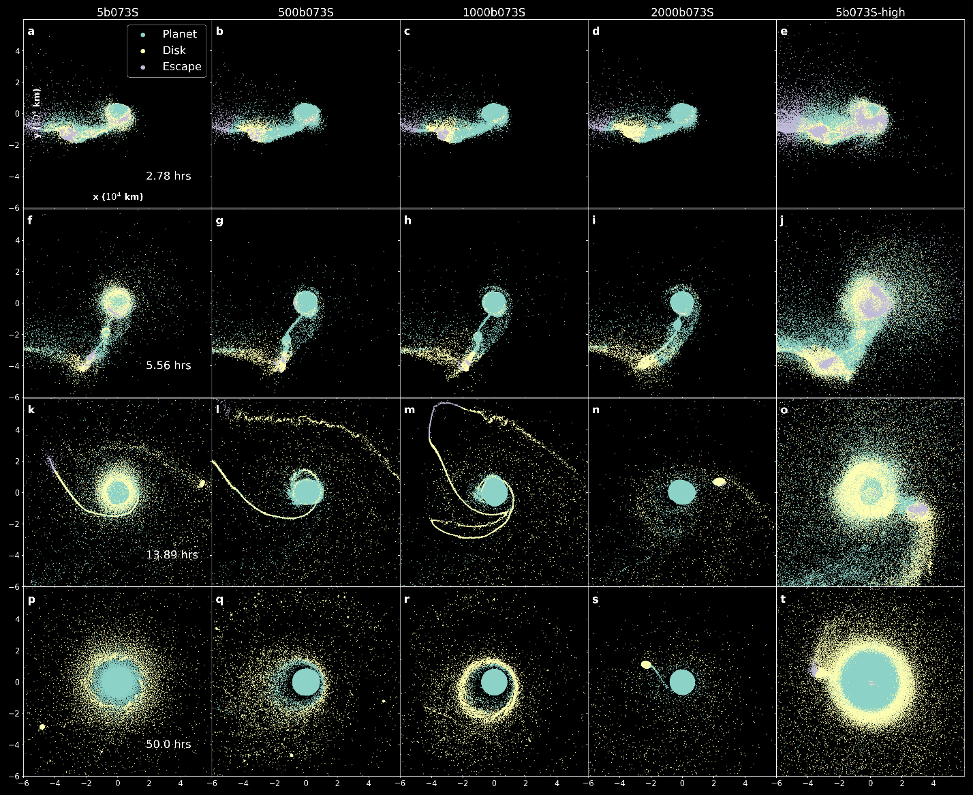
 |
| November 2022 Volume 11 Issue 4 |

The conventional theory for the origin of the Earth’s Moon is the giant impact hypothesis, which describes an oblique, low-velocity collision between the Earth and a Mars-sized planet, Theia (Canup & Asphaug, 2001). Within this framework, the Moon accretes from a debris disk that is produced by the impact. This model can reproduce the mass, dynamics, and low iron content of the Moon. A well-known weakness of the canonical giant impact hypothesis is that the remnants of Theia’s mantle dominate the disk, which contradicts the strong isotopic similarities between the Earth and Moon that suggest a common material origin if the Theia’s isotopic composition differed from the Earth.
Smoothed Particle Hydrodynamics (SPH) is the numerical method of choice for simulating high-energy astrophysical events such as the giant impact. SPH is a particle method in which ... [full article]
Dear Community,
Travel is back. This summer and fall have been full of workshops, meetings and, for some of you, field work. Reconnecting with many of you reminded me what a great community of researchers we have built over the last 16 years. All the familiar and new faces at workshops, hackathons, and meetings of the CIG supported community codes PyLith, ASPECT, SPECFEM, and Rayleigh continued to highlight the value of in person interactions. Many of the conversations would not have been possible over zoom. Meeting face to face also drove home not only the number of people who have been involved in community code but the passion our developer communities have for open source software. This dedication has helped grow users communities world wide and broaden software and software engineering skills. As I see many of our talented early career scientists accept jobs in industry, I am saddened yet at the same time happy that our young researchers have software skills that are in demand.
CIG's software direction has evolved and will continue to evolve in the next 5 years. However, as we approach nearly two decades as an organization, our commitment to building better software built on best practices and supporting open source software communities remains steadfast. We look forward to continuing this journey with you and the next generation of scientists.
Lorraine Hwang, Director
To attend, remember to register prior to the meeting. [register]
UC Davis has recently updated their travel policies. All participants supported for travel by CIG now must register their trips prior to the end of travel. To implement this policy, you will need to complete an online form so our staff can register your trip. Good news is that there will be one less document to file. Travelers who register their trip will no longer need to fill out the NonEmployee Travel Form and their reimbursements will be processed quicker. Travelers who do not must file the NonEmployee Travel form and will receive an additional form once their Travel Reimbursement Request (TRR) is received.
Everyone will still need to fill out the TRR form once travel is completed.
Travel policies and forms can be found on our website under Contact Us > Travel Reimbursement. Please read through our travel policies and FAQs especially when booking air travel. Contact us through the ticketing system with your travel questions.
Elections are now open for this year's elections - 3 seats are open on the Executive Committee and 3 on the Science Steering Committee. We thank Claire Currie, Bruce Buffet and Carolina Lithgow-Bertelloni for their leadership on the EC and SSC members Juliane Dannberg, Scott King, and John Naliboff for their contributions to the community. New this year is a 1 year early career seat on the SSC. Contact your Member Representative for voting. The 2022 Elections close Monday November 28, 2023. [slate]
Not a member? Contact us about joining.
CIG Monthly Webinars are the second Thursday of the month at 2P PT. Watch the forum for the announcement of the 2022-2023 Webinar schedule.
| November 29 | CIG Annual Business Meeting |
| December | - AGU - |
| January 12 | tbd |
| February 9 | Tobias Keller, ETH |
| March 9 | Chase Million, Million Concepts |
| April 13 | Adina Pusok, Oxford University |
| May 11 | SZ4D |
Registration for Workshops will be announced as they become available.
PyLith 3.0.3 14 October 2022
SW4 3.0 beta 2 November 2022